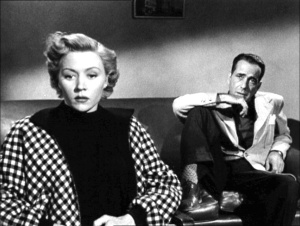Conversation: From the Beginning to the End
Shared by Nina Rubin
”
Most people are quick to start relationships when they meet someone with potential. We hang on to every word like precious helium balloons: we are enamored and interested in the hot air and floating, zipping excitement that a new person provides. New relationships give us hope, desire and a chance to be seen in a way that an ex probably missed. The beginning of a relationship is awesome: staying up all night talking or going on amazing dates, like watching a lunar eclipse or going to a baseball game in a new stadium or taking an impromptu cross-country road trip because, why not?
I’m not sure when a new, sparkly relationship becomes a regular relationship, and then one that requires work.
When and why does the shine dull? What happens that we get more comfortable and our best behavior starts to wear off?
The most evident aspect to the shift from ‘new relationship’ status to regular ‘relationship’ is the talking and communication.
My clients talk about this, I’ve experienced it and a few of my friends have curiously wondered what went wrong. The common theme I hear is “we talked so openly at the beginning and now we hardly talk about real things that matter. I don’t know what to do.” At the beginning, we all look like the emojis with red hearts for eyes and pink, blushing cheeks, and by the time we’re in regular relationships, we have straight lines for mouths and Xs for eyes and basic yellow circles for heads.

When does a relationship stop being the beginning? Is it when we are bored? When we are too comfortable? When we have kids? When we go through a crisis or big experience together and really lean on each other? Is it when we stop eating dinner at the dining table and instead eat like zombies in front of TV reruns? Is it when someone starts an affair and no longer has desire for their partner? Is it when we hit the three- or seven-year mark and that’s an indication to bail? What about the three-month, six-month and year marks going from honeymoon phase to imperfect stage to real relationship that has made a revolution of each season?
I’ve noticed from my own experiences that relationships change and get more difficult when the talking stops. The creative, imaginative, attuned, fun-loving, communicative talking turns into grunts and short answers, eye contact often amiss and physical touch reserved for special times. Communication becomes stale and perfunctory. We feel dull or lonely. We secretly beg for a glance, an inside joke, a reminder of what it felt like at the beginning.
Commonly, we communicate with our friends, clients, colleagues, and even our partners via text messages. Some of my younger clients carry entire relationships through their phone screens and experience loads of miscommunication and over-analysis. So much confusion happens via text that might not otherwise happen if we were to talk. Texting important feelings often drives a wedge between couples, can feel remote and detached or cold. And yet, we still do it. It’s the path of least resistance. It’s easier. It’s immediate.
We crave connecting, we want to be seen, to feel, to be united again. We don’t understand why the talking stopped.
This is what I’ve noticed people say when the real talking stops:

What’s up?! Feeling tired? Why did you watch Homeland without me? I’m going out with my friends, hope you don’t mind! Did you feed the dog? Why are the children acting out? Did you pick up the dry cleaning? I’m sick of this. I need space.
These sentiments often put partners on the spot or may be damaging to the relationship because they seem blaming or impersonal. Sometimes these questions and statements are rhetorical, which can feel even worse, when there’s not space for a real answer. Sometimes there is no talking at all, and the people move around their homes robotically, trying to avoid each other.
In my time with clients and in relationships, these are topics, questions and statements people wish they could talk about:
I’m not sure if I’m happy, are you? What do you expect? Why are you mad so often? Why are you upset with me? Do you love me? I feel alone. I miss my friends. I don’t feel seen. I feel like I’m too much. I can’t compare with your ex. I’m not enough.
Am I making this up? Why do I lose my voice with you? Is it even worth expressing? I don’t feel like I matter. I don’t feel like my thoughts and opinions are valued or taken in. I don’t feel like I contribute or have influence in this relationship. Your silent treatments chip away at my soul.
I want you to share my excitement and encourage it! I want to talk about creative and imaginative things, not just things you’ve already considered or decided. I want us to be a team! I want to rely on you and I want you to rely on me. Let’s take an adventure together!
What are your dreams? How do you want your (and our) life to look when…? What would you rather: a lifetime supply of groceries or free travel? What’s meaningful to you in your life? What do I mean to you? You mean so much to me and here’s why: I love you.
How did we go from the beginning, just months ago, to this? I can handle it. Please be real with me. Talk to me.

These sentiments are often unspoken because we don’t think we know how to say them, we don’t get warmth from our partners, or we are unsure of ourselves. We forget how to talk when we haven’t been talking.The closeness and intimacy may go away when we feel distant, even though this is the exact time to lean in to ourselves and our partners. We get awkward, uncomfortable, are afraid we’ll be judged, or even talk ourselves out of saying something kind because we’re scared. I bet if we shared our feelings with greater frequency and authenticity, our relationships would be more fulfilling and happier. We may have important things to say, but don’t give our partners a chance to hear us. We are trying to protect our partners by keeping the conversation polite or by protecting them.
I also believe if we gave our partners permission to be themselves, to express their thoughts and feelings, we’d be met with open arms and warm hearts. Each person would likely start to feel an ease in having these conversations. It can be so tricky, and I commend anyone in a long relationship who has been able to keep talking and prolong the connection. The ideal is when a long relationship always feels like the beginning.
“
Do you love to write? If you have a story, article, post about dating or love, please Share your Heartbeat! We would love you feature your writing.
Thank you!


I love your blog and your writing. I just LOVE IT!
LikeLiked by 2 people
Thank you!! What great feedback!
LikeLike
I was recently in a situation where the talking stops and the silent continues getting louder and louder as if I am the only one who can hear it until eventually I had to disconnect myself from the situation. I enjoy reading this blog, I learn something each time so thank you 🙂
LikeLiked by 1 person
Thank you for reading my ideas and sharing yours. I’m glad this struck a chord with you.
LikeLiked by 1 person
I think complacency is the poison to all great relationships. We get so caught up in our daily duties we forget how to connect. Sometimes we reach out with a grand gesture forgetting that you can’t force a genuine moment. It’s harder to feel brand new, and shiny when someone has heard or been a part of all your stories. I have been in the same relationship for 34 years, and in those moments where there’s nothing new to say I just make my way to wherever he is, and curl up next to him. There’s a lot of warmth in just making sure your present.and accounted for. 😉 Good post! G-uno
LikeLike
For any relationship to survive both people have to work at it full time, 24/7. That is an impossible task? Every relationship is being tested by both external and internal circumstances. If both people in the relationship don’t work at it, it going to spin out, crash and burn. It does appear that each person will simply have to give 100% and not to be worrying about being on the receiving end, this creates a starting point were neither one can feel inferior or left out. As you sey in your story people quit talking to one another and that is the starting of the end. So sad, talk is cheap and talk is easy but not used. It should be, instead it takes on a form of yelling, that communication has never worked on animal or human.
Thanks for your writing and your thoughts.
LikeLike
You are right. For couples who come in to see me often before or after the breakup
communication, communication styles differences, or a lack of any is the number of the latter one BIG stumbling block.
LikeLike
Wait what? I need to edit that arg
LikeLike
Pingback: Conversation: From the Beginning to the End | Pages in my mind